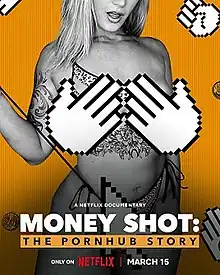Money Shot: The Pornhub Story
Money Shot: The Pornhub Story is a 2023 Netflix documentary about Pornhub and its parent company MindGeek. It presents interview footage from sex workers, ex-Pornhub employees, journalists, and anti-sex-trafficking figures. The documentary focuses on a 2020 scandal over Pornhub hosting non-consensual pornography, including of children, and how the aftermath affected pornographic performers.
| Money Shot: The Pornhub Story | |
|---|---|
 Promotional poster | |
| Directed by | Suzanne Hillinger |
| Produced by |
|
| Cinematography | Iris Ng |
| Edited by | Alexis Johnson |
| Music by | Kyle Scott Wilson |
Production company | Jigsaw Productions |
| Distributed by | Netflix |
Release date | March 15, 2023 |
Running time | 94 minutes |
| Country | United States |
| Language | English |
Netflix approached Jigsaw Productions about the film Director Suzanne Hillinger wanted to highlight sex workers' opinions because she believed that they had been underrepresented in media coverage. Hillinger said that many figures in the pornographic industry were initially reluctant to participate. Cherie DeVille was skeptical but participated to present the narrative that anti-sex-trafficking groups had right-wing agendas. Ex-MindGeek employee Noelle Perdue worked as an archivist and fact-checker, as well as being interviewed.
According to Rotten Tomatoes, most reviews of the documentary were positive. However, reviewers were divided on many topics, including the message, provenance, and pacing. Some critics called it neutral, but others saw it as pro-sex work. The focus on anti-sex-trafficking organizations' political aims was generally seen as a strength, but some reviews criticized the interviews as lacking depth and a viewpoint. Other reviewers concluded that Pornhub's content moderation was lacking and that there are issues with the concentration of money and power in the industry.
Synopsis
The documentary, which presents interview footage without narration, opens with subjects recounting their first memories of watching pornography. It interviews sex workers and individuals associated with the Canadian corporation Pornhub, including former employees, journalists, and legal figures. It also shows the filming, editing, and organization involved in the work of pornographic performers Gwen Adora and Siri Dahl.
Pornhub began as a free tube site to watch pirated content, comparable to LimeWire for music or The Pirate Bay for movies. It was founded by three Concordia University students and sold to Fabian Thylmann of MindGeek, a data company, in 2010. After Thylmann was convicted of tax evasion, Pornhub and MindGeek came under the control of Feras Antoon and David Tassillo and investor Bernd Bergmair. Pornhub gained traction through search engine optimization (SEO) and turned a profit through advertisements and promotions. However, pornographic performers were unable to monetize their content on the website until the Modelhub feature in 2018.

A civil lawsuit against Pornhub has 30 plaintiffs; it is led by lawyer Michael Bowe. The plaintiffs state that the company is complicit in non-consensual pornography that featured them, including revenge porn, videos of rape, and videos of child sexual abuse. Bowe accuses Pornhub of racketeering. On this subject, Dani Pinter, a representative of the National Center on Sexual Exploitation (NCOSE), criticizes child sexual exploitation on Pornhub.
The topic of child pornography victims is the subject of a 2020 article for The New York Times by Nicholas Kristof: "The Children of Pornhub".[lower-alpha 1] Around the same time, the Christian non-profit Exodus Cry led a campaign, '#Traffickinghub', that opposed sex trafficking content on Pornhub. Sex workers in the documentary characterize Exodus Cry as a far-right organization founded by an Evangelical preacher, whose mission is to end all sex work. They say a similar thing of NCOSE, which was formerly called Morality in Media.
Kristof's article and Exodus Cry's campaign led Mastercard and Visa to disallow payment processing with the company and caused Pornhub to ban uploads by unverified users. Kristof's article had suggested three changes to Pornhub: require user verification, prevent user download, and increase content moderation. Dahl said these were "insanely reasonable" measures that sex workers favored. However, according to Michael Stabile, most of Pornhub's income came from banner ads and so the credit card company boycotts primarily affected individual performers.
A hearing of the Parliament of Canada investigates non-consensual content on Pornhub. Evidence is presented that, though MindGeek cooperates with the National Center for Missing & Exploited Children (NCMEC) to remove non-consensual content, content moderators have been expected to view at least 700 flagged videos per day—more than they can properly investigate. Stabile notes that, shortly after his location was mentioned in the Parliament of Canada, MindGeek CEO Feras Antoon's mansion was burned down, although the culprit and motive are not known.
Noelle Perdue criticizes MindGeek, for whom she worked as a pornographic script writer, producer, and recruiter for three years. She says that not all Pornhub executives were aware of the U.S. bill FOSTA-SESTA (2018), which affected legal sex workers. Additionally, sex workers raise issues they face from other internet companies. For example, in October 2021, OnlyFans said that it would prohibit pornographic material. Adora says this left pornographic actors like her in financially insecure positions. Dahl comments that website censorship is an issue for sex workers: their accounts on Instagram can be shadow banned even if no sexual material is posted, and sites like OnlyFans ban words associated with consensual sexual activity, such as "pegging". Allie Knox describes that changes to Craigslist increased danger to sex workers while making child traffickers harder to identify.
Interviewees
- Gwen Adora, pornographic actress
- Asa Akira, pornographic actress and spokesperson for Pornhub
- Michael Bowe, legal representative for victims of non-consensual pornography on Pornhub
- Whitney Burgoyne, ex-Pornhub employee
- Siri Dahl, pornographic actress
- Cherie DeVille, pornographic actress
- Natassia Dreams, pornographic actress and spokesperson for Pornhub
- Wolf Hudson, pornographic actor
- Allie Knox, pornographic actress
- Nicholas Kristof, journalist for The New York Times
- Bree Mills, pornographic director
- Martin Patriquin, journalist for The Logic
- Noelle Perdue, ex-MindGeek employee
- Dani Pinter, spokesperson for the National Center on Sexual Exploitation
- Yiota Souras, spokesperson for the National Center for Missing & Exploited Children
- Michael Stabile, spokesperson for the Free Speech Coalition
Production
The documentary was released on streaming platform Netflix on March 15, 2023, in around 65 countries.[1][2] It was directed by Suzanne Hillinger and edited by her wife Alexis Johnson. Netflix approached Jigsaw Productions about making a documentary on Pornhub and corporate responsibility. The first scenes shot were with Bowe on the day he filed a legal complaint.[3]
Hillinger described the central focus as "what sexuality and consent means when billion-dollar internet platforms thrive on user-generated content".[1] Hillinger aimed for it to facilitate "important conversations about sex and consent".[1] Hillinger said that issues with non-consensual content applied to the entirety of the internet, not just Pornhub.[4] According to Hillinger, NCOSE had "some questionable motives" but Pinter was knowledgeable, persuasive and did not refuse to answer difficult questions. Hillinger chose not to focus on the financial supporters of Exodus Cry or NCOSE, believing it would have distracted from larger themes of privacy, consent, and free speech.[3]
Hillinger said that many ex-MindGeek employees had signed non-disclosure agreements (NDAs) with the company and were "really, really scared" to participate in the documentary. Adora put Hillinger into contact with Perdue, who was "rightly suspicious" at first.[3] In addition to being interviewed, Perdue served as an archivist and fact-checker for the documentary. She has written about sex work for newspapers including Slate, The Washington Post and Wired.[5] As a self-described "internet porn historian", Perdue hoped the documentary would cause viewers to feel a "sense of responsibility" and "engage further ... out of curiosity instead of shame or stigma".[5][4] Perdue began as a script writer for Brazzers, a MindGeek-owned production company, and moved onto writing LGBT stories. After becoming uncomfortable with this, she requested a move to Modelhub. She left in 2020, perceiving the company as ignoring the feedback of pornographic performers. Perdue said that Money Shot should have shown wider context of content moderation on the internet and the nature of trafficking.[6]
Hillinger wanted to center sex workers because she felt that they were underrepresented in Kristof's op-ed and media reporting.[4] She did not give interviewees the right to approve the edited footage of them that was used. Hillinger said she opened conversations by acknowledging that subjects would be suspicious of her and stating that the documentary would not have a narrator. She suggested that Adora trusted her after reviewing her filmography and because of their shared queer identity.[3] Dahl gave positive feedback to the final product, saying that it succeeded in presenting the viewpoint of sex workers "in a way they never have been before" and sparked conversations about sex work and porn among the public.[2]
DeVille wrote in Rolling Stone that campaigns presenting as anti-sex-trafficking were right-wing, Christian, and anti-porn, and that Hillinger said the film would present this narrative. Though skeptical of being interviewed, DeVille agreed to participate, choosing to use soft colors and wear clothing that covered her skin to mitigate being portrayed as unintelligent or untruthful. Filming took place at a rented cottage outside Los Angeles over four hours. She said that she neither hated nor loved the film and did not regret her role in it.[7]
Adora's Instagram account was suspended on the day that Money Shot premiered and Hillinger's was suspended one week later.[8]
Reception
Netflix stated that in its first week, Money Shot was streamed for 13 million hours; it was the fourth-most-watched film on the platform. It reached the top ten in each country it was available in.[2] On review aggregator Rotten Tomatoes, which categorized 31 reviews as either positive or negative, the documentary holds an approval rating of 84%.[9] It was rated 2.5 out of 5 stars by News24 and 2 stars by The Indian Express and The Guardian.[10][11][12]
Some reviewers criticized the documentary's narrative and scope. The Daily Beast's Nick Schager and News24's Gabi Zietsman felt there was a lack of investigative journalism and that subjects were not covered in sufficient depth.[13][10] Similarly, in The Indian Express, Rohan Naahar criticized the "loose narrative".[11] Lucy Ford wrote in GQ that the scope was too broad.[14] In a review for Jezebel, however, Rich Juzwiak wrote that it "excels at teasing out the nuances" of the topic.[15] Barry Hertz suggested in The Globe and Mail that it was too slow-paced.[16] Noel Murray of Los Angeles Times thought its runtime was too short, but that it contained irrelevant sexually explicit content.[17] However, reviewers largely found the tone unsalacious[11][13][10] and Schager criticised the film for misleadingly depicting pornography as largely softcore.[13]
Various comments were made on the overall message of the documentary. The title is a pun, referring both to Pornhub's revenue streams and a cum shot in pornography.[13] Ford lauded the decision to open with "the deeply unsexy reality" of Pornhub's use of data and advertising and the logistics of producing and editing sexual material. Ford suggested that the documentary's message is that pornography is a "capitalist monopoly" dictated by economic factors.[14] Polygon's Katie Rife saw it to have a persuasive opposition to the concentration of unaccountable power in the hands of "tech bros and venture capitalists".[18] Naahar believed, on the other hand, that the documentary has "absolutely nothing new to contribute": he found it obvious that Pornhub had engaged in unethical behaviors, sex workers became "collateral damage", and the company's "damage control" was not virtuous.[11] Peter Bradshaw of The Guardian wrote that a more interesting, unexplored question is whether Pornhub—and non-pornographic websites—are publishers or platforms, and what responsibility they have for content that they host.[12]
Critics differed on the matter of neutrality. Critics such as Zietsman and Variety's Owen Gleiberman viewed the film as neutral, the latter praising the "no-fuss journalistic evenhandedness".[10][19] Murray approved its perspective as "thoughtful", despite the complicated topic.[17] Hertz believed its neutrality was a negative, as it suffered from unresolved tension between the opposing views it presents.[16] Zietsman commented that the documentary devoted most of its screen time to adult industry workers.[10] Bradshaw believed the documentary presented these workers as "creative entrepreneurs and heroes of consenting sensuality".[12] Rife said that, in the context of a longstanding clash of feminist views on pornography, it centered the underrepresented views of sex workers.[18] Juzwiak wrote that industry workers are given a chance to explain the effects of anti-sex-trafficking measures on their lives and Pornhub was scrutinized for "grossly inadequate" content moderation.[15]
On the subject of anti-sex-trafficking campaigners, Rife wrote that the documentary takes a "bold stance": the campaigners overstate the prevalence of child sexual abuse material on Pornhub.[18] Gleiberman said that documentary gives "detached and sobering" analysis of the campaigners claims.[19] Juzwiak opined that the documentary succeeds in showing that "anti-sex operatives" are capitalizing on a legitimate backlash to sexual exploitation with a "narratively compelling" reveal of NCOSE's political agenda, albeit one that "somewhat confuses the message".[15] As well as Juzwiak, Schager was critical of Pinter's commentary on behalf of NCOSE.[13][15] The lack of contributions from current Pornhub employees or anti-Pornhub campaigners was criticized by Naahar.[11] Similarly, it was conspicuous to Bradshaw that Exodus Cry's Laila Mickelwait was not interviewed.[12]
Notes
- Kristof, Nicholas (December 4, 2020). "The Children of Pornhub". The New York Times.
References
- Spangler, Todd (February 15, 2023). "Netflix Sets Pornhub Documentary 'Money Shot' Premiere Date". Variety. Archived from the original on March 7, 2023. Retrieved April 8, 2023.
- Turner, Gustavo (March 21, 2023). "Pornhub Doc 'Money Shot' is 4th Most Watched Netflix Movie Worldwide". XBIZ. Archived from the original on March 27, 2023. Retrieved April 9, 2023.
- Bright, Susie (March 16, 2023). "The Truth About Pornhub". Book and Film Globe. Archived from the original on March 27, 2023. Retrieved April 8, 2023.
- Horton, Adrian (March 15, 2023). "'The story is really complicated': inside the controversial world of Pornhub". The Guardian. Archived from the original on April 7, 2023. Retrieved April 8, 2023.
- Tisdale, Jennifer (March 15, 2023). "Noelle Perdue, a Porn Historian, Lends Her Expertise to 'Money Shot: The Pornhub Story'". Distractify. Archived from the original on March 22, 2023. Retrieved April 8, 2023.
- Dickson, EJ (March 16, 2023). "A Frank Talk With the Ex-Pornhub Employee in Netflix's 'Money Shot'". Rolling Stone. Retrieved August 6, 2023.
- DeVille, Cherie (March 11, 2023). "Why I Chose to Appear in Netflix's Controversial Pornhub Documentary". Rolling Stone. Archived from the original on March 30, 2023. Retrieved April 8, 2023.
- Turner, Gustavo (March 23, 2023). "Instagram Deplatforms Director of Netflix's Pornhub Documentary 'Money Shot'". XBIZ. Archived from the original on April 5, 2023. Retrieved April 9, 2023.
- "Money Shot: The Pornhub Story". Rotten Tomatoes. Archived from the original on March 22, 2023. Retrieved April 8, 2023.
- Zietsman, Gabi (March 20, 2023). "Its title may be the most salacious thing about Netflix's bare minimum doccie Money Shot". News24. Archived from the original on March 29, 2023. Retrieved April 8, 2023.
- Naahar, Rohan (March 18, 2023). "Money Shot The Pornhub Story movie review: New Netflix documentary takes timid approach to potentially scandalous story". The Indian Express. Archived from the original on March 20, 2023. Retrieved April 8, 2023.
- Bradshaw, Peter (March 11, 2023). "Money Shot: The Pornhub Story review – doc can't find a point of view". The Guardian. Archived from the original on April 7, 2023. Retrieved April 8, 2023.
- Schager, Nick (March 11, 2023). "How Pornhub Became Public Enemy Number One for Christian Crusaders". The Daily Beast. Archived from the original on March 30, 2023. Retrieved April 8, 2023.
- Ford, Lucy (March 15, 2023). "The deeply unsexy truth at the centre of Netflix's Money Shot". GQ. Archived from the original on March 25, 2023. Retrieved April 8, 2023.
- Juzwiak, Rich (March 14, 2023). "Pornhub, Exploitation, and the Casualties of an Anti-Sex Crusade". Jezebel. Archived from the original on April 5, 2023. Retrieved April 8, 2023.
- Hertz, Barry (March 17, 2023). "Five things to stream this weekend: Netflix's Money Shot: The Pornhub Story offers skin-deep look at internet's dirtiest little secret". The Globe and Mail. Archived from the original on April 7, 2023. Retrieved April 8, 2023.
- Murray, Noel (March 20, 2023). "Review: Keira Knightley pursues the 'Boston Strangler' in Hulu journalistic thriller". Los Angeles Times. Archived from the original on April 4, 2023. Retrieved April 8, 2023.
- Rife, Katie (March 15, 2023). "Netflix's Pornhub documentary is out to radicalize and weaponize porn fans". Polygon. Archived from the original on March 23, 2023. Retrieved April 8, 2023.
- Gleiberman, Owen (March 11, 2023). "'Money Shot: The Pornhub Story' Review: A Netflix Documentary Explores the World's Reigning Porn Site and the Clampdown On It". Variety. Archived from the original on March 29, 2023. Retrieved April 8, 2023.
Further reading
- Bradley, Sian (March 15, 2023). "How Pornhub became the front line of the war on sex work". Dazed.
- Corbett, Erin (March 15, 2023). "The History of Pornhub: A Timeline of How It Started and Where It Stands Now". Netflix.

.JPG.webp)
